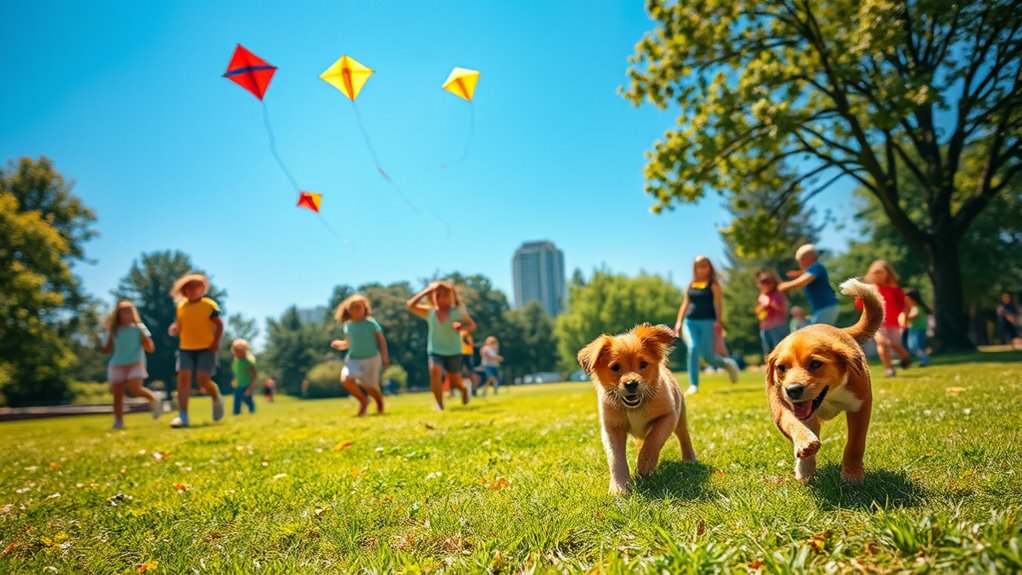Kids need outdoor playtime because it’s essential for their physical, emotional, and social growth. Outdoor activities encourage them to be active, helping maintain a healthy weight and reduce screen time. You’ll notice they develop better social skills by cooperating and sharing with peers. Plus, spending time in nature boosts mood and lowers stress, fostering emotional well-being. As children face challenges while playing outside, they build resilience and confidence. Discover how these elements intertwine for lasting benefits.
Key Takeaways
- Outdoor playtime reduces screen time and promotes at least 60 minutes of daily physical activity for children’s health.
- Nature exposure improves mood, concentration, and cognitive abilities, enhancing academic performance.
- Collaborative play fosters social skills like cooperation, negotiation, and conflict resolution among peers.
- Spending time outdoors lowers stress and anxiety levels, promoting emotional well-being and regulation.
- Outdoor challenges build resilience and confidence, empowering children to tackle obstacles and learn new skills.

In today’s digital age, kids need outdoor playtime more than ever. With screens dominating their attention, it’s imperative to encourage them to step outside and engage in outdoor play. This not only helps promote at least 60 minutes of daily physical activity, but it also plays a significant role in maintaining a healthy weight. By making it a priority for your children to play outside, you’re reducing their risk of obesity-related health issues and giving them a chance to develop healthy habits that last a lifetime.
Encouraging outdoor play is vital for kids’ health, combatting screen time, and fostering lifelong healthy habits.
The health benefits of outdoor play extend beyond just physical fitness. When kids engage in nature exposure, studies show they experience improved mood and concentration. This leads to better academic performance and enhanced cognitive abilities. You’ll notice that after a good session of outdoor activity, your children are often more focused and ready to tackle their schoolwork. It’s a simple yet effective way to boost their overall well-being and mental acuity.
Moreover, unstructured outdoor play is essential for developing social skills. As your children play outside, they learn to cooperate, share, and navigate relationships through collaborative and imaginative activities. By interacting with their peers in a natural setting, they’re gaining invaluable life skills that will serve them well into adulthood. Watching them negotiate roles in games or resolve conflicts shows just how important these experiences are for their social development.
Emotional health is another area where outdoor play shines. Nature exposure helps lower stress and anxiety levels in kids, contributing to improved emotional regulation. You’ll find that after spending time outdoors, they come back feeling more relaxed and balanced. This is imperative in today’s fast-paced world, where children often face pressures that can affect their mental health.
Finally, regular outdoor activities foster risk-taking and resilience. When your kids play outside, they’re testing their limits, learning new skills, and developing confidence in their abilities. Climbing trees, riding bikes, or exploring new terrains pushes them to face challenges and develop a sense of accomplishment. This confidence translates into other aspects of their lives, empowering them to tackle obstacles with courage.
Ultimately, prioritizing outdoor playtime for your kids is essential for their physical, emotional, and social well-being. So, encourage them to step outside, explore, and enjoy all the benefits that come with outdoor play.

Step2 Rain Showers Splash Pond Water Table, Kids Water and Sand Activity Sensory Playset, Summer Outdoor Toys, 13 Piece Water Toy Accessories, For Toddlers 1.5+ Years Old, Blue & Green
This kids’ water table will create a mini water park right in your backyard! Use the large bucket…
As an affiliate, we earn on qualifying purchases.
As an affiliate, we earn on qualifying purchases.
Frequently Asked Questions
Why Is It Important for a Child to Play Outside?
It’s important for a child to play outside because it boosts their physical health and encourages active movement.
When they’re outdoors, they explore, develop motor skills, and engage with their environment. You’ll notice their mood improves, and they become more focused after some fresh air.
Plus, playing outside helps them build social skills as they interact with peers, learning to cooperate and solve problems together during unstructured playtime.
Why Is It Important to Observe Children During Outdoor Play?
Observing children during outdoor play is like watching a masterclass in social dynamics! You gain invaluable insights into their communication and teamwork skills.
By paying attention, you can uncover their interests, encouraging creativity and problem-solving. You’ll notice emotional responses that help you support their emotional regulation.
Plus, observing their physical development guarantees they’re hitting those essential milestones. Your documentation enhances connections between home and school, fostering a shared understanding of their growth and learning journey.
What Happens if Kids Don’t Play Outside?
If kids don’t play outside, they miss out on essential physical activity, leading to potential obesity and health issues.
You’ll notice they might struggle with focus and behavior due to pent-up energy.
Social skills can lag, as they miss chances for interaction with peers.
Their mood may dip, increasing stress and feelings of sadness.
Additionally, without outdoor experiences, they could find it harder to develop problem-solving skills and resilience.
Why Is Playtime Important to Child Development?
You might’ve noticed how kids transform during playtime—one moment, they’re explorers, and the next, they’re problem-solvers.
Playtime’s essential for child development because it fuels their creativity, sharpens social skills, and builds confidence. As they navigate friendships and tackle challenges, they learn to share, collaborate, and think critically.
Engaging in diverse activities not only boosts their physical health but also enriches their emotional and cognitive growth, setting a strong foundation for their future.

SEKKAF Kids Sunglasses Youth Baseball Sunglasses for Boys Girls Softball Sports Sun Glasses UV Protection
KIDS BASEBALL SUNGLASSES – fashion polycarbonate frames, enhancing the youthful style of teenagers. The wrap-around design offers better…
As an affiliate, we earn on qualifying purchases.
As an affiliate, we earn on qualifying purchases.
Conclusion
To sum up, outdoor playtime isn’t just a luxury; it’s essential for your kids’ growth and happiness. As they explore, climb, and run, they’re not only building physical skills but also fostering creativity and social connections. The theory that outdoor play boosts mental well-being holds true—your children thrive when they step outside. So, encourage them to play in nature, breathe fresh air, and embrace the adventures waiting just beyond your door. Their minds and bodies will thank you!

GINMIC Kids Explorer Kit & Bug Catching Kit, 16 Pcs Outdoor Exploration Safari Kit for Kids Camping with Binoculars, Adventure, Hunting, Hiking, Educational Toy Gift for 3-12 Years Old Boys Girls
【Great Kids Camping Set】- GINMIC Kids Explorer & Bug Catching Kit Includes Binoculars, Costume Vest, Hat with Quick…
As an affiliate, we earn on qualifying purchases.
As an affiliate, we earn on qualifying purchases.

Kids Bike Helmet Set, Adjustable Helmet for Ages 3-10 Year Boys Girls, Pad Set with Knee and Elbow Pads for Bike, Roller, Skating, Scooter, Longboard and More Sports
【7 In 1 Protective Gear Set】Adjustment helmet knee pads and elbow pads set provide all-around safety for your…
As an affiliate, we earn on qualifying purchases.
As an affiliate, we earn on qualifying purchases.









